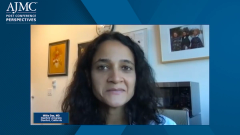
Emphasizing Biomarker-Driven Treatment and Individualized Care Strategies for Patients With NSCLC
Dr Millie Das, MD discusses updates from the 2022 World Conference on Lung Cancer regarding non-small cell lung cancer (NSCLC).
Episodes in this series

Millie Das, MD: The care for patients with non–small cell lung cancer will become more biomarker driven and individualized as we’re trying to understand resistance mechanisms to our targeted therapies and to immunotherapy. Ultimately, providing individualized treatment will provide better survival and quality of life for our patients, which is the ultimate goal.
I attended a number of great sessions. Thanks for the opportunity to share some of the ones that I found to be the most impactful. It was great that a smoking cessation-focused abstract was included in the top-rated abstracts plenary session. Smoking continues to be a major problem both in the US and worldwide, with 30 million US adults still smoking and over a billion smokers worldwide, if you can believe it. The abstract that was presented showed that a smoking cessation program in conjunction with low-dose CT screening is feasible and can hopefully help reduce the global impact of lung cancer.
Another abstract that made a big splash was the CALGB (Alliance) trial, which compared sublobar resection vs lobectomy in patients with early-stage non–small cell lung cancer with tumor size of less than 2 cm. The results from this trial indicated that sublobar resection was noninferior to lobectomy in this patient population. This is potentially practice-changing, and shows once again that more isn’t necessarily always better.
It was also nice to hear the progression-free survival and overall survival data from the phase 2 NADIM study (NCT03838159) of neoadjuvant nivolumab plus chemotherapy. This was the first clinical study of neoadjuvant chemotherapy to show an improvement in overall survival, with pathologic complete response rates correlating well with survival outcomes. There are a number of other ongoing phase 3 trials of neoadjuvant immunotherapy and chemotherapy. We’re looking forward to hearing the results from those studies as well over the next few years.
Finally, I’d be remiss if I didn’t mention small cell lung cancer, which remains a disease close to my heart because it’s oftentimes overlooked. The advances in small cell haven’t been as forthcoming. There were several sessions at WCLC [World Conference on Lung Cancer] this year that were dedicated to small cell lung cancer, which was great. We now have a better understanding of the transcriptional subtypes in small cell and how they may be identified using DNA methylation techniques on peripheral blood and by using IHC [immunohistochemistry] staining of tumor specimen. Moving forward, the goal is to establish biomarker-driven studies in small cell lung cancer, similar to what we’re already doing in non–small cell lung cancer. There’s a lot of hope there as well.
Transcript edited for clarity.
Newsletter
Stay ahead of policy, cost, and value—subscribe to AJMC for expert insights at the intersection of clinical care and health economics.










